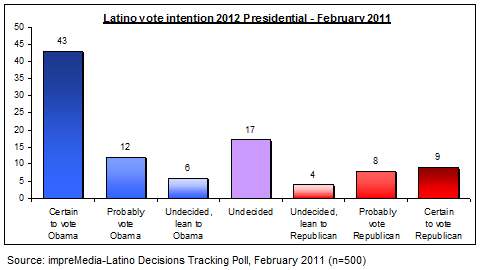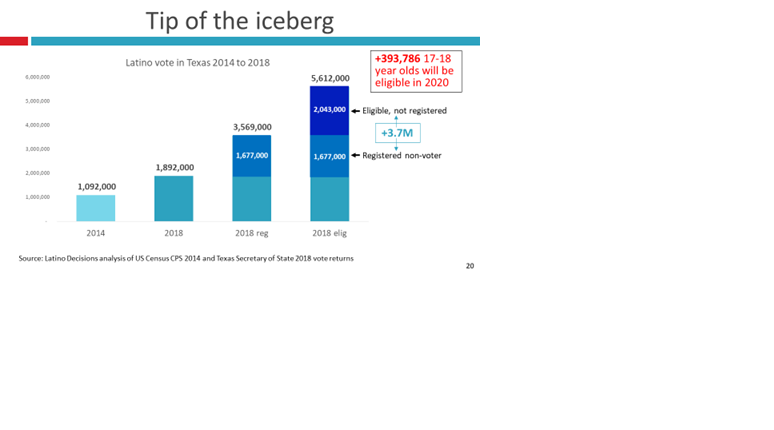Despite the dire situation of the economy and the lack of immigration solutions, President Barack Obama’s approval rating among Latino voters increased again to 70% after decreasing in mid-2010. But that support does not translate into automatic votes for 2012. The second part of a poll conducted by impreMedia and Latino Decisions (LD) also reveals that, although Latino voters will not automatically vote for Obama—only 43% are sure they will vote for him next year—doubts about the president and the Democrats are not turning into support for the Republicans.

This is the first of six polls to be conducted by impreMedia and Latino Decisions this year about the most important issues for the Latino community. The second one, planned for April, will focus on health care. [ Full poll results posted here ]
The president’s approval rating is strong, although there are degrees of support: 32% of those polled said they strongly support Obama, while 38% somewhat approves of the president’s performance. In 2010, Obama’s rating among Latino voters decreased to 57% according to a June Gallup poll, and it was at 60% in a September LD poll.
Part of the decrease in the president’s approval rating occurred within the context of the continuing economic anxiety of Latinos and a failure to meet promises on immigration, “but the image began to improve when there was a new attempt to approve the DREAM Act, which ended up failing,” said Matt Barreto, a political science professor at the University of Washington and pollster for Latino Decisions.
Back then, the White House made an effort to increase communication with Latinos. Although the bill failed, Latinos still give Obama the benefit of the doubt regarding the economy and immigration.
“There is no doubt that Obama has the ability to win the Latino vote, and he still has solid support within the community. But when it comes to whether they will vote for him for sure, Latinos show a margin of doubt,” said Barreto.
As far as the GOP is concerned, only 9% of Latino voters said that they will vote for a Republican candidate and another 8% said that they might. This is one of the lowest levels of support obtained by the Republicans in recent years, and far less than the 40% a GOP candidate would need to make a difference in key states to become president.
“I think the most interesting story here is how badly the Republicans are faring with Latinos. It is as if Latinos are not pro-Democrat, but rather anti-Republican,” said Gary Segura, a political science professor at Stanford University.
The 2012 election is very far and in politics everything changes very quickly, according to Adrián Pantoja, a political scientist and professor at Pritzer College. “If Obama wants to be reelected, he is going to have to generate more enthusiasm among Latinos,” said Pantoja.
“Latinos are not enthusiastic about this government. In reality, there is little to be enthusiastic about,” added Pantoja. “At the same time, the Republican party has not taken advantage of the opportunity to get closer to them; just the opposite.”
For Louis De Sipio, a political science professor at UC Irvine, Latinos feel for Obama the same ambivalence as other voters after a little over two years of government. But once the election is nearer and an opponent appears, things “will become much clearer.”
The poll also explored how Latinos support the parties and their opinion about the work each party is doing to get closer to the community. The Democratic party fared relatively better than the Republican party, although it did not get top grades.
Of those polled, 52% said the Democratic party is getting close to the Latino community, while 35% said the party is not interested in Latinos or is negative toward them. The numbers for Republicans are more negative: 18% said the party does not do a good job for Latinos and 66% said it is negative or does not care about the community.
In part, experts attribute the continued (although not enthusiastic) support of Latinos for Obama and the Democrats to the fact that basically, there is nowhere to turn.
“What I see is that Latinos have few options. Yes, we are disillusioned by some things, the economy hits us hard, immigration reform did not happen despite an attempt, but in the end, the only ally we have in D.C. seems to be Obama,” said Pantoja.
Or at least that seems to be the perception of Latino voters.
One thing is clear: they do not like Sarah Palin. Asked about their image of the former governor of Alaska, these voters said that it is predominantly negative: 53% unfavorable versus 23% favorable.
“Palin’s message is not resonating with Latinos. In a way she has an image problem similar to the one Meg Whitman [the Republican candidate for governor] had in California… During the 2008 campaign, I remember she used the phrase that she was referring to the ‘true America.’ I think that Latinos do not feel she is addressing them,” said Pantoja.
Latino voters do not have a good image of Congress either: only 8% strongly approves them, and 34% approves them “up to a certain point.” Also, 22% said “none” (something like neither this nor that) and 34% disapproves of Congress.
As for party affiliation, the trend of having more independents than Republicans continues like in recent years: 14% identified themselves as Republicans, 54% as Democrats, 18% as independent and 7% as other.
In 2008, 67% of Latinos voted for Obama and the Democrats and 31% voted for John McCain and the Republicans. Much will depend on what Obama does during the rest of his term, as well as who the Republican candidate is.
There is a wing of the Republican party that is aware of its bad image among Latinos, according to Barreto. “That is why people like Jeb Bush have been insisting that attention must be paid to the party’s relationship with Latinos,” he said. “Because what this poll reveals is very bad news for Republicans.”
Although Latinos are not completely happy with Obama, the option they see on the other side is that of a Republican party dedicated to approving measures like repealing healthcare reform and the idea of stripping citizenship from children of undocumented immigrants. “It is very hard for a majority of the community to be able to identify with and support these ideas,” added Pantoja.
Methodology
A poll of 500 Latino registered voters was conducted in January and February 2011 in 21 states where 95% of registered Latino voters live. It has a margin of error of +/-4.38%. Latino Decisions began conducting these polls in August 2010 and will continue doing them jointly with impreMedia during the next 12 months, tracking Latino voters. This is the first and until now the only continuous tracking poll among polls of Latinos in the United States. New poll results will be released in April 2011.


